 ATHLETE COOKBOOK Copyright 2020 by Great World Press All rights reserved V1/04 Copyright 2020 - All rights reserved. The content contained within this book may not be reproduced, duplicated or transmitted without direct written permission from the author or the publisher. Under no circumstances will any blame or legal responsibility be held against the publisher, or author, for any damages, reparation, or monetary loss due to the information contained within this book, either directly or indirectly. Legal Notice: This book is copyright protected. It is only for personal use. You cannot amend, distribute, sell, use, quote or paraphrase any part, or the content within this book, without the consent of the author or publisher.
ATHLETE COOKBOOK Copyright 2020 by Great World Press All rights reserved V1/04 Copyright 2020 - All rights reserved. The content contained within this book may not be reproduced, duplicated or transmitted without direct written permission from the author or the publisher. Under no circumstances will any blame or legal responsibility be held against the publisher, or author, for any damages, reparation, or monetary loss due to the information contained within this book, either directly or indirectly. Legal Notice: This book is copyright protected. It is only for personal use. You cannot amend, distribute, sell, use, quote or paraphrase any part, or the content within this book, without the consent of the author or publisher.
Disclaimer Notice: Please note the information contained within this document is for educational and entertainment purposes only. All effort has been executed to present accurate, up to date, reliable, complete information. No warranties of any kind are declared or implied. Readers acknowledge that the author is not engaged in the rendering of legal, financial, medical or professional advice. The content within this book has been derived from various sources. Please consult a licensed professional before attempting any techniques outlined in this book.
By reading this document, the reader agrees that under no circumstances is the author responsible for any losses, direct or indirect, that are incurred as a result of the use of the information contained within this document, including, but not limited to, errors, omissions, or inaccuracies. Table of Contents
Chapter 1 Veganism and Sport
What if you want to do sports while vegan? How realistic is it to be competitive in achieving sports results? What do doctors and nutritionists say about this? Vegan athletes compete with athletes who eat meat if they eat well. This applies to a variety of athletic disciplines, including triathlon and even bodybuilding, as a group of Australian researchers led by Professor Dilip Gosh has concluded. The results of the study were presented to the public in the form of a presentation at the annual Institute of Food Technologists (IFT) Annual Meeting & Expo. Feeding a vegan athlete means that to achieve record sporting results, he or she needs to add products to his or her diet that compensate for the deficiency of other athletes' meat and other animal products. The impetus for the study was the recent discovery of a burial site for Roman gladiators, which gives good reason to believe that these fierce and indefatigable warriors were vegetarians.
Scientists have also taken into account that some record-breaking athletes, such as Bart Yasso and Scott Jurek, or the triathlete Brendan Brazier, are still vegetarians today.  Official positions of medical and nutritional organizations regarding vegetarianism and veganism Swiss Health Authority* "Sufficient intake of vegan vitamin B12 can only be obtained from special additives, but all other nutrients, including calcium and iron, can be obtained from plant products." The American Dietetic Association* "Properly designed vegetarian diets, including vegan diets, are healthy and complete, suitable for people of all ages, pregnant and nurturing women, children, teenagers, athletes, and can also help prevent and treat certain diseases" - Position of the American Dietetic Association. British Food Foundation* "A balanced vegetarian or vegan diet can be complete, but more extreme diets, such as eating raw materials, are often ineffective and do not provide the full range of essential micronutrients, making them completely unacceptable for children....Studies of vegetarian and vegan children in the UK have shown that they develop and grow within normal limits" - Briefing Paper on Vegetarian nutrition. "Nutritionists of Canada"* "A properly planned vegetarian diet is healthy, nutritionally complete and can play a positive role in the prevention and treatment of certain diseases" - Position of the American Dietetic Association and Dietitians of Canada. Dr. Dr. Dr.
Official positions of medical and nutritional organizations regarding vegetarianism and veganism Swiss Health Authority* "Sufficient intake of vegan vitamin B12 can only be obtained from special additives, but all other nutrients, including calcium and iron, can be obtained from plant products." The American Dietetic Association* "Properly designed vegetarian diets, including vegan diets, are healthy and complete, suitable for people of all ages, pregnant and nurturing women, children, teenagers, athletes, and can also help prevent and treat certain diseases" - Position of the American Dietetic Association. British Food Foundation* "A balanced vegetarian or vegan diet can be complete, but more extreme diets, such as eating raw materials, are often ineffective and do not provide the full range of essential micronutrients, making them completely unacceptable for children....Studies of vegetarian and vegan children in the UK have shown that they develop and grow within normal limits" - Briefing Paper on Vegetarian nutrition. "Nutritionists of Canada"* "A properly planned vegetarian diet is healthy, nutritionally complete and can play a positive role in the prevention and treatment of certain diseases" - Position of the American Dietetic Association and Dietitians of Canada. Dr. Dr. Dr.
Dilip Gosh has calculated the ideal nutritional formula for athletes who can be either vegan or vegetarian or meat logged: 45-65% of food should be carbohydrates, 20-25% fat, and 10-35% protein (figures may vary depending on training and other factors). Gosh said that "athletes can achieve full nutrition even on a pure vegetable diet if they are vegan - Vegetarian - if they keep to their calories and regularly consume several essential foods. Gauche cited non-animal sources of iron, creatine, zinc, vitamin B12, vitamin D, and calcium is vital. One of the most critical success factors for athletes is sufficient iron consumption, says Dr. Dilip Gosh. He stressed that this problem is more acute for female athletes, as this group of vegan athletes, according to his observations, may have a non-anemic iron deficiency.
Iron deficiency is primarily affecting the reduction of endurance training results. Vegans generally characterized by reduced levels of creatine in their muscles, gosh notes, so these athletes must take the issue of their nutritional status very seriously. Speaking of specific products for athletes, Dr. Dilip Gosh considers the most useful: -Soy drinks; -Nuts; -Orange and yellow vegetables, as well as leafy vegetables (cabbage, herbs); -Fruit; -Vitaminized cereal flakes for breakfast; -Milk and dairy products (for those athletes who consume milk). Dr. Dilip Gosh noted that his research is very young and that it will take years of scientific observation for athletes to get a detailed picture of the sports training under vegetarian, vegan conditions.
However, in his opinion, the forecast for vegan athletes is very favorable. Athletes who adhere to vegetarian or vegan diets have proven many times that plant food is no worse than an animal to achieve sporting achievements. However, novice athletes often lack some nutrients. We find out how to eat plant foods during intensive sports activities. Vegan athletes often face particular challenges in meeting their nutrient needs, but with careful dietary planning, this can be avoided. If you need proof, look at Scott Gordon Jurek, an ultra marathonist who trains up to eight hours a day and eats only plant foods.
Or the famous boxer Mike Tyson, the great athlete Carl Lewis, tennis player Serena Williams. The list of vegan athletes and vegetarians is extensive. A vegetarian or vegan diet can fit perfectly into an athlete's training plan. Vegetarian diets usually contain a large amount of "good" carbohydrates - the primary fuel for athletes, without which they can feel sluggish, tired, have problems with kidneys and other organs. Vegetables, fruits, whole grains, nuts, and seeds contain quality carbohydrates, vitamins, minerals, and fiber.  The myth that vegans and vegetarians do not eat protein has been dispelled many times.
The myth that vegans and vegetarians do not eat protein has been dispelled many times.
Vegetable protein sources have low levels of saturated fat and do not contain cholesterol, maintaining a healthy cardiovascular system, unlike animal products. Good protein sources for vegan athletes include quinoa, buckwheat, brown rice, protein-enriched pasta, nuts, tofu, soya milk, soya cheese and yogurt, peanut butter, beans, and peas. Are there enough plant foods? However, athletes have some specific issues to consider when planning and following a diet. They should carefully control the intake of vitamin B12, which can be obtained through fortified yeast (not to be confused with bakery products) or through natural additives. In addition to B12, vegan athletes (especially beginners) often face deficiencies in calcium, iron, zinc, iodine, magnesium, vitamin D and riboflavin. Vegan and vegetarian diets also tend to contain large amounts of fiber, which can lead to meteorism and abdominal bloating if high-fiber foods are consumed immediately before or during exercise.


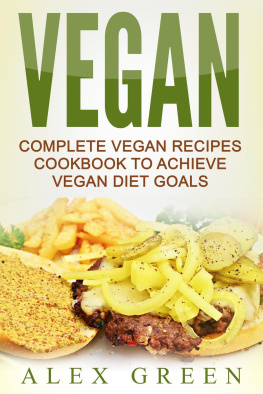
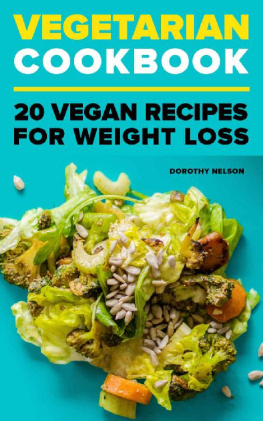

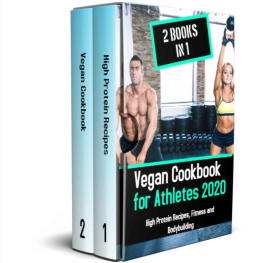
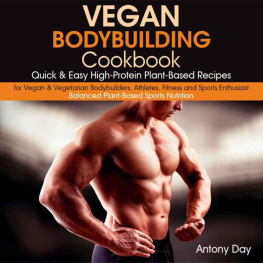
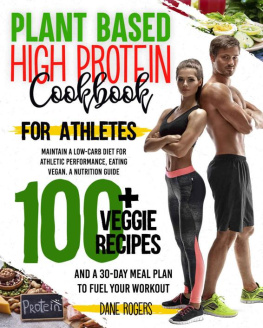
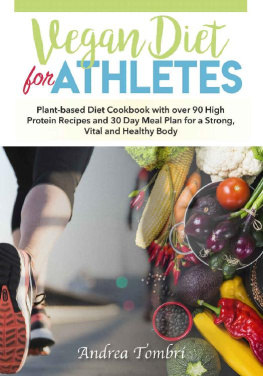
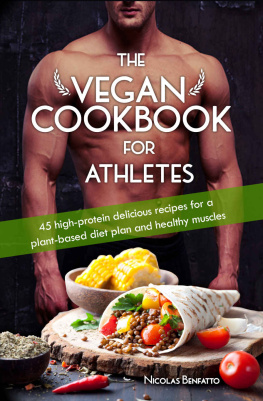
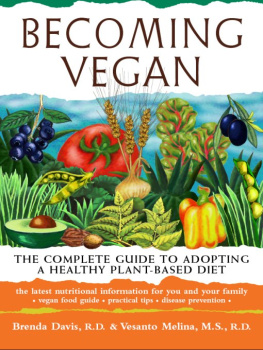
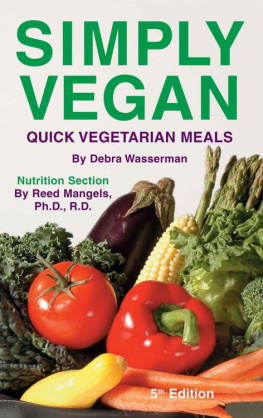
 ATHLETE COOKBOOK Copyright 2020 by Great World Press All rights reserved V1/04 Copyright 2020 - All rights reserved. The content contained within this book may not be reproduced, duplicated or transmitted without direct written permission from the author or the publisher. Under no circumstances will any blame or legal responsibility be held against the publisher, or author, for any damages, reparation, or monetary loss due to the information contained within this book, either directly or indirectly. Legal Notice: This book is copyright protected. It is only for personal use. You cannot amend, distribute, sell, use, quote or paraphrase any part, or the content within this book, without the consent of the author or publisher.
ATHLETE COOKBOOK Copyright 2020 by Great World Press All rights reserved V1/04 Copyright 2020 - All rights reserved. The content contained within this book may not be reproduced, duplicated or transmitted without direct written permission from the author or the publisher. Under no circumstances will any blame or legal responsibility be held against the publisher, or author, for any damages, reparation, or monetary loss due to the information contained within this book, either directly or indirectly. Legal Notice: This book is copyright protected. It is only for personal use. You cannot amend, distribute, sell, use, quote or paraphrase any part, or the content within this book, without the consent of the author or publisher. Official positions of medical and nutritional organizations regarding vegetarianism and veganism Swiss Health Authority* "Sufficient intake of vegan vitamin B12 can only be obtained from special additives, but all other nutrients, including calcium and iron, can be obtained from plant products." The American Dietetic Association* "Properly designed vegetarian diets, including vegan diets, are healthy and complete, suitable for people of all ages, pregnant and nurturing women, children, teenagers, athletes, and can also help prevent and treat certain diseases" - Position of the American Dietetic Association. British Food Foundation* "A balanced vegetarian or vegan diet can be complete, but more extreme diets, such as eating raw materials, are often ineffective and do not provide the full range of essential micronutrients, making them completely unacceptable for children....Studies of vegetarian and vegan children in the UK have shown that they develop and grow within normal limits" - Briefing Paper on Vegetarian nutrition. "Nutritionists of Canada"* "A properly planned vegetarian diet is healthy, nutritionally complete and can play a positive role in the prevention and treatment of certain diseases" - Position of the American Dietetic Association and Dietitians of Canada. Dr. Dr. Dr.
Official positions of medical and nutritional organizations regarding vegetarianism and veganism Swiss Health Authority* "Sufficient intake of vegan vitamin B12 can only be obtained from special additives, but all other nutrients, including calcium and iron, can be obtained from plant products." The American Dietetic Association* "Properly designed vegetarian diets, including vegan diets, are healthy and complete, suitable for people of all ages, pregnant and nurturing women, children, teenagers, athletes, and can also help prevent and treat certain diseases" - Position of the American Dietetic Association. British Food Foundation* "A balanced vegetarian or vegan diet can be complete, but more extreme diets, such as eating raw materials, are often ineffective and do not provide the full range of essential micronutrients, making them completely unacceptable for children....Studies of vegetarian and vegan children in the UK have shown that they develop and grow within normal limits" - Briefing Paper on Vegetarian nutrition. "Nutritionists of Canada"* "A properly planned vegetarian diet is healthy, nutritionally complete and can play a positive role in the prevention and treatment of certain diseases" - Position of the American Dietetic Association and Dietitians of Canada. Dr. Dr. Dr. The myth that vegans and vegetarians do not eat protein has been dispelled many times.
The myth that vegans and vegetarians do not eat protein has been dispelled many times.